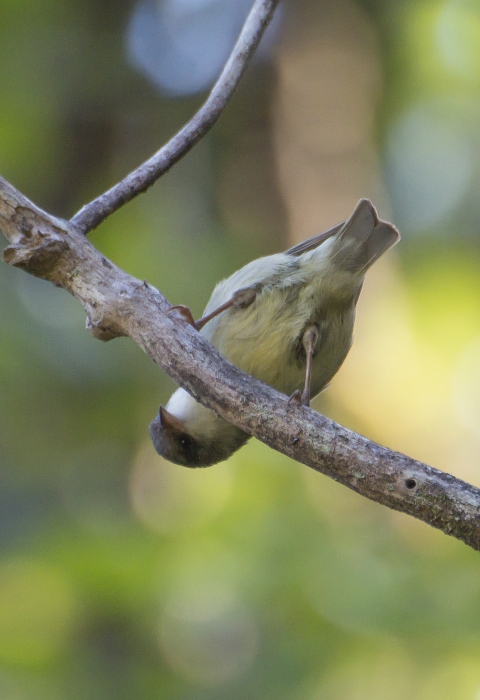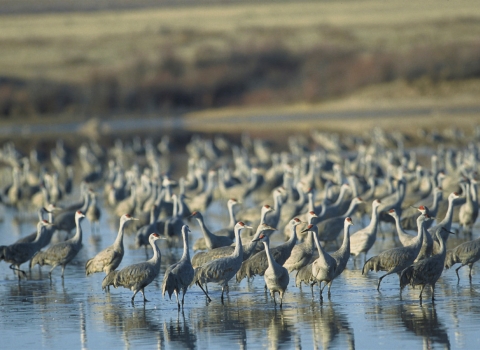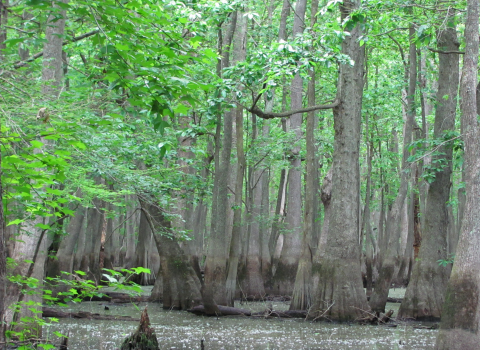HONOLULU — The U.S. Fish and Wildlife Service announced that it will receive $7.5 million to help protect threatened and endangered Hawaiian forest birds from extinction. Hawaii’s forest birds face a myriad of threats including avian malaria, a disease that is transmitted by invasive mosquitoes. The funding includes $1 million for inter-bureau extinction prevention efforts to help develop new technology to stop the spread of avian malaria, and $6.5 million in grant funding for the State of Hawai‘i to support additional captive care capacity for at risk forest birds and the of implementation of mosquito control strategies.
This announcement is part of the Department of the Interior national announcement of funding for 125 ecosystem restoration projects that will receive nearly $68.4 million in fiscal year 2022 funding from President Biden’s Bipartisan Infrastructure Law Bipartisan Infrastructure Law
The Bipartisan Infrastructure Law (BIL) is a once-in-a-generation investment in the nation’s infrastructure and economic competitiveness. We were directly appropriated $455 million over five years in BIL funds for programs related to the President’s America the Beautiful initiative.
Learn more about Bipartisan Infrastructure Law . With a total of $1.4 billion for Department of the Interior investments in ecosystem restoration efforts over the next five years, the Bipartisan Infrastructure Law is building on proven projects, programs and partnerships that conserve our cherished wildlife and natural resources.
“President Biden’s Bipartisan Infrastructure Law is a once-in-a-generation investment that will allow us to restore healthy ecosystems across the country,” said Secretary of the Interior Deb Haaland. “This is an important step towards building a better America for people and wildlife, for generations to come.”
Across Hawai‘i, native forest birds have been experiencing population declines that have accelerated in the last one to two decades. While habitat loss, invasive species invasive species
An invasive species is any plant or animal that has spread or been introduced into a new area where they are, or could, cause harm to the environment, economy, or human, animal, or plant health. Their unwelcome presence can destroy ecosystems and cost millions of dollars.
Learn more about invasive species and non-native predators have negatively affected forest bird species for hundreds of years, and continue to do so; introduced diseases, particularly avian malaria, are the greatest threat to forest birds today. Just one bite can kill a forest bird. Together, the cooperative efforts between the USFWS, U.S. Geological Survey, National Park Service, Office of Native Hawaiian Relations, and State of Hawai‘i have resulted in $14.092 million for forest bird conservation allocated from the Bipartisan Infrastructure Law.
In Hawai‘i, natural resources are cultural resources and the welfare of native forest birds, and the social, biocultural, and cultural connections of these birds to their natural environment help to inform conservation actions. The announced funding will invest in projects to help recover endangered species like the ‘akikiki (Oreomystis bairdi) and ‘akeke‘e (Loxops caeruleirostris) on Kaua‘i, and kiwikiu (Pseudonestor xanthophrys) and ‘ākohekohe (Palmeria dolei) on Maui. These four species of birds were identified as facing imminent extinction within the next 1-10 years. Fortunately, a recent report authored by the USGS, USFWS, and ONHR outlines community–supported strategies to prevent their extinction, and the BIL funding will enable the Service and its partners to implement critical strategies and keep these important and iconic animals in Hawai‘i for years to come.
The U.S. Fish and Wildlife Service works with others to conserve, protect, and enhance fish, wildlife, plants, and their habitats for the continuing benefit of the American people. For more information, visit www.fws.gov/pacificislands, or connect with us through any of these social media channels at https://www.facebook.com/PacificIslandsFWS, www.flickr.com/photos/usfwspacific/, https://medium.com/usfwspacificislands or www.twitter.com/USFWSPacific.



